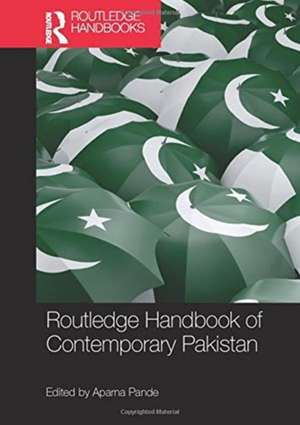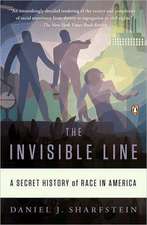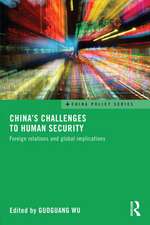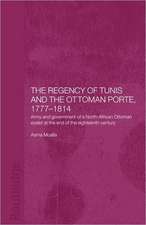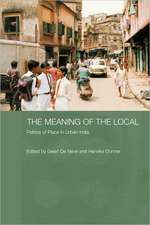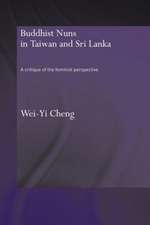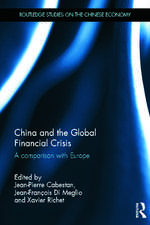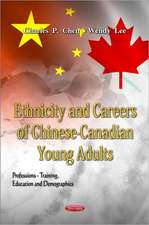Routledge Handbook of Contemporary Pakistan
Editat de Aparna Pandeen Limba Engleză Paperback – 30 sep 2020
The Handbook is divided into the following sections:
• Economy and development
• External relations and security
• Foundations and identity
• Islam and Islamization
• Military and jihad
• Politics and institutions
• Social issues
The Handbook explains the reasons why Pakistan is so often at the forefront of our daily news intake, with a focus on religious and political factors. It asks questions regarding the institutions and political parties which govern Pakistan and provides an insight into the relationships which the country has forged since its creation, culminating in a discussion of the state’s involvement in conflict. Covering a range of topics, this Handbook offers a wide range of perspectives on Pakistan.
Bringing together a group of leading international scholars on Pakistan, the Handbook is a cutting-edge and interdisciplinary resource for those interested in studying Pakistani politics, economics, culture and society and South Asian Studies.
| Toate formatele și edițiile | Preț | Express |
|---|---|---|
| Paperback (1) | 436.45 lei 6-8 săpt. | |
| Taylor & Francis – 30 sep 2020 | 436.45 lei 6-8 săpt. | |
| Hardback (1) | 1221.40 lei 6-8 săpt. | |
| Taylor & Francis – 29 aug 2017 | 1221.40 lei 6-8 săpt. |
Preț: 436.45 lei
Nou
Puncte Express: 655
Preț estimativ în valută:
83.54€ • 90.77$ • 70.22£
83.54€ • 90.77$ • 70.22£
Carte tipărită la comandă
Livrare economică 21 aprilie-05 mai
Preluare comenzi: 021 569.72.76
Specificații
ISBN-13: 9780367581152
ISBN-10: 0367581159
Pagini: 554
Dimensiuni: 174 x 246 x 31 mm
Greutate: 0.93 kg
Ediția:1
Editura: Taylor & Francis
Colecția Routledge
Locul publicării:Oxford, United Kingdom
ISBN-10: 0367581159
Pagini: 554
Dimensiuni: 174 x 246 x 31 mm
Greutate: 0.93 kg
Ediția:1
Editura: Taylor & Francis
Colecția Routledge
Locul publicării:Oxford, United Kingdom
Public țintă
PostgraduateNotă biografică
Aparna Pande is Research Fellow and Director of the Initiative on the Future of India and South Asia at the Hudson Institute, USA.
Cuprins
Introduction, Aparna Pande, Shefali Dhar and Sidhanta Mehra
Part I: Foundations and Identity
1. Escaping India: Pakistan's Search for Identity, Aparna Pande
2. Pashtunistan: Postcolonial Imaginaries Along Borderlands, 1947−57, Amna Qayuum
3. Religion, Ethnicity and Violence in Pakistan, Muhammad Ismail Khan
4. Jinnah's Pakistan: Debating the Nature of the State, 1947−49, Yaqoob Bangash
5. The Encounter with Modernity in the Rural and Tribal Areas of Pakistan in Pakistani English Fiction, Muneeza Shamsie
6. Cricket − What Unites Us, Ahmer Naqvi
Part II: Politics and Institutions
7. Talk the Talk: Why Parties Walk and Matter (Even in Pakistan), K. Haroon Ullah
8. A Weberian Perspective on the Nature of the State in Pakistan, Ajay Darshan Behera
9. Profit, Protest, and Power: Bazaar Politics in Urban Pakistan, Umair Javed
10. Judiciary in Crisis: Judicial Politics in Pakistan, Nida Paracha
11. Pakistan's Patchwork of High Court Justice, Waris Husain
Part III: Economy and Development
12. Pakistan's Elite Capture and the State of Insecurity, Imtiaz Gul
13. From Chaos to Building a Secure, Sustainable Energy Future, Atta Ali Malik
14. Pakistan, the United States, and the Bretton Woods Institutions (BWIs): A Continuing Great Game?, Ehtesham Ahmad and Azizali Mohammad
15. The Banking and Financial Sector of Pakistan, Feisal Khan
Part IV: Social Issues
16. Dissimilar Histories: History Curricula in Government and Elite Pakistani Schools, Madiha Afzal
17. Pakistan's Philanthropic Education Alternative, Marie Lall
18. Sanctioning Subordination? The Politics of Gender Laws Promulgation and Reform in Pakistan, Bushra Asif
Part V: Islam and Islamization
19. Explaining Support for Sectarian Terrorism in Pakistan: Piety, Maslak and Sharia, Christine Fair
20. Pakistan's Descent into Religious Intolerance, Farahnaz Ispahani
21. Competing Visions of Women's Rights in Pakistan: State, Civil Society and Islamist Groups, Anita Weiss
Part VI: Military and Jihad
22. Wither Dr Jekyll and Mr Hyde?, Mohammad Taqi
23. Rules for the Double Game, Stephen Tankel
24. Violent Non-State Actors in the Afghanistan−Pakistan Relationship: Historical Context and Future Prospects, Daveed Gartenstein-Ross and Tara Vassefi
25. The Other Pakistan: Understanding the Military−Jihadi Complex, Pranay Kotasthane, Guru Aiyar and Nitin Pai
Part VII: External Relations and Security
26. India as a Factor in Pakistan's Policy, Savita Pande
27. The Afghanistan−Pakistan Conundrum: History and a Likely Future Scenario with Focus on the Pashtun Areas, Farhat Taj and Syed Rashid Ali
28. Iran and Pakistan: A Case of Keeping a Distance, Alex Vatanka
29. Saudizing Pakistan: How Pakistan is Changing and what this means for South Asia and the World, Pervez Hoodbhoy
30. Pakistan and the United States: Strategic Partnership, Discordant Goals, Teresita Schaffer and Howard Schaffer
31. Pakistan and One Belt, One Road Initiative: Prospects for the China−Pakistan Economic Corridor, Andrew J. Small and Ben Lamont
Part I: Foundations and Identity
1. Escaping India: Pakistan's Search for Identity, Aparna Pande
2. Pashtunistan: Postcolonial Imaginaries Along Borderlands, 1947−57, Amna Qayuum
3. Religion, Ethnicity and Violence in Pakistan, Muhammad Ismail Khan
4. Jinnah's Pakistan: Debating the Nature of the State, 1947−49, Yaqoob Bangash
5. The Encounter with Modernity in the Rural and Tribal Areas of Pakistan in Pakistani English Fiction, Muneeza Shamsie
6. Cricket − What Unites Us, Ahmer Naqvi
Part II: Politics and Institutions
7. Talk the Talk: Why Parties Walk and Matter (Even in Pakistan), K. Haroon Ullah
8. A Weberian Perspective on the Nature of the State in Pakistan, Ajay Darshan Behera
9. Profit, Protest, and Power: Bazaar Politics in Urban Pakistan, Umair Javed
10. Judiciary in Crisis: Judicial Politics in Pakistan, Nida Paracha
11. Pakistan's Patchwork of High Court Justice, Waris Husain
Part III: Economy and Development
12. Pakistan's Elite Capture and the State of Insecurity, Imtiaz Gul
13. From Chaos to Building a Secure, Sustainable Energy Future, Atta Ali Malik
14. Pakistan, the United States, and the Bretton Woods Institutions (BWIs): A Continuing Great Game?, Ehtesham Ahmad and Azizali Mohammad
15. The Banking and Financial Sector of Pakistan, Feisal Khan
Part IV: Social Issues
16. Dissimilar Histories: History Curricula in Government and Elite Pakistani Schools, Madiha Afzal
17. Pakistan's Philanthropic Education Alternative, Marie Lall
18. Sanctioning Subordination? The Politics of Gender Laws Promulgation and Reform in Pakistan, Bushra Asif
Part V: Islam and Islamization
19. Explaining Support for Sectarian Terrorism in Pakistan: Piety, Maslak and Sharia, Christine Fair
20. Pakistan's Descent into Religious Intolerance, Farahnaz Ispahani
21. Competing Visions of Women's Rights in Pakistan: State, Civil Society and Islamist Groups, Anita Weiss
Part VI: Military and Jihad
22. Wither Dr Jekyll and Mr Hyde?, Mohammad Taqi
23. Rules for the Double Game, Stephen Tankel
24. Violent Non-State Actors in the Afghanistan−Pakistan Relationship: Historical Context and Future Prospects, Daveed Gartenstein-Ross and Tara Vassefi
25. The Other Pakistan: Understanding the Military−Jihadi Complex, Pranay Kotasthane, Guru Aiyar and Nitin Pai
Part VII: External Relations and Security
26. India as a Factor in Pakistan's Policy, Savita Pande
27. The Afghanistan−Pakistan Conundrum: History and a Likely Future Scenario with Focus on the Pashtun Areas, Farhat Taj and Syed Rashid Ali
28. Iran and Pakistan: A Case of Keeping a Distance, Alex Vatanka
29. Saudizing Pakistan: How Pakistan is Changing and what this means for South Asia and the World, Pervez Hoodbhoy
30. Pakistan and the United States: Strategic Partnership, Discordant Goals, Teresita Schaffer and Howard Schaffer
31. Pakistan and One Belt, One Road Initiative: Prospects for the China−Pakistan Economic Corridor, Andrew J. Small and Ben Lamont
Descriere
This Handbook explains the reasons why Pakistan is so often at the forefront of our daily news intake, with a focus on religious and political factors. It asks questions regarding the institutions and political parties which govern Pakistan and provides an insight into the relationships which the country has forged since its creation.
